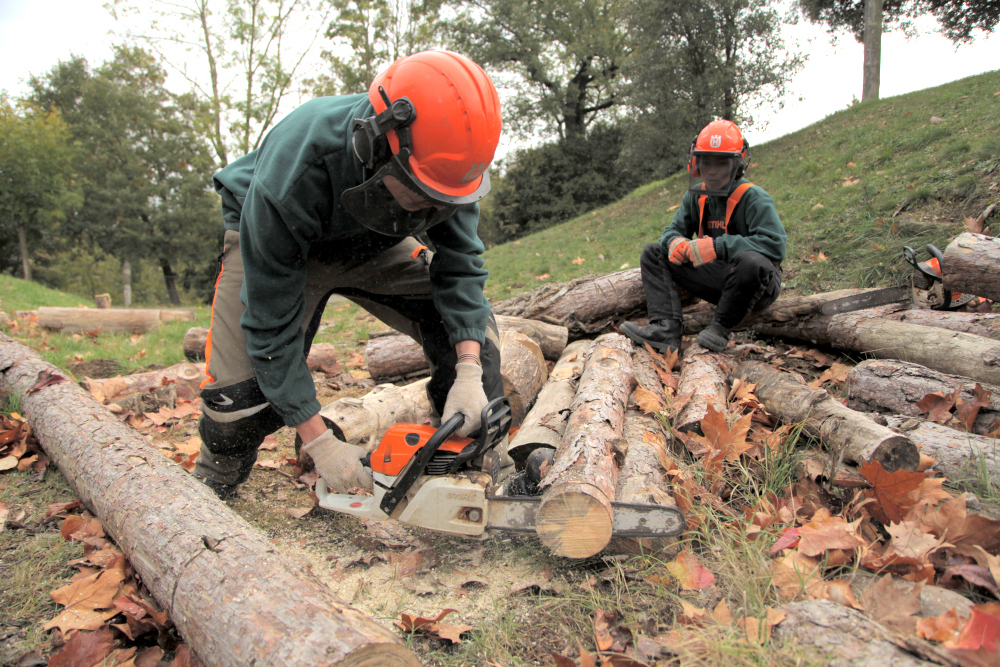Ongoing training - Forestry Sector
ECC European Chainsaw Certification

Mobility among forestry and landscaping workers within the European Union is constantly growing. The development of European standards to add European recognition to the brand of national certificates increases the value of workers willing to work in other member states. The development of European standards offers other countries currently lacking national certification the opportunity to participate in an internationally recognised system. This increases transparency and mobility within the European common market and thus strengthens the forestry, arboriculture and landscape management sectors with regard to chainsaw use.
This certification provides transparency in chainsaw operators’ professional skills and competences, reduces occupational accidents in the sector and promotes labour mobility between the European countries that are part of the project.
ECC European Chainsaw Certification for companies/adults
A new development is that the school offers training and examinations directly to companies for the different levels of the European chainsaw certification. Training is given to companies with the programming of the syllabus according to the level of the course required. Workers thus have the notions of the proper use and handling of the machinery and can carry out maintenance and repair small breakdowns.
For the company, the fact of being able to do the course on site helps to minimise costs and downtime of the workers, who can also use the training received to enhance the work flow.
Introduction
EFESC has developed a common qualification standard for chainsaw users across Europe.
Its main objectives are:
To reduce accidents and fatalities.
To reduce the economic and personal costs associated with accidents.
To improve and increase the operator’s skills and efficiency in the workplace.
To improve operator mobility and employment between European countries.
To improve and expand the provision of existing training and professional evaluation standards.
To encourage and promote lifelong learning and continuous professional development.
European chainsaw regulations
Since 2008, all chainsaw standards from participating countries have been inventoried and evaluated.
In collaboration with various training centres, assessment centres and certifiers throughout Europe (Austria, Belgium, Denmark, Germany, France, the Netherlands, Spain and the United Kingdom), four chainsaw levels have been prepared.
The levels are tested and evaluated by an international team of chainsaw instructors and assessors.

ECC Qualification
Each level has a very detailed description of the qualification needed, with requirements relating to knowledge, understanding and practical skills. For further information, refer to the different levels of ECC.
Quality
The European Chainsaw Certificate can only be used when quality is assured. EFESC has developed a form for these standards. Therefore, only certified training providers with accredited assessors can issue chainsaw certificates under ECC standards.
Training providers are audited by the National Agency (NA). If there is no National Agency in the country, another accredited NA may carry out the audit.
Having passed the audit, the training provider may issue respective EU certificates to participants passing the tests.
An additional EU logo may be applied if using an existing certificate. Certified training providers will be listed in a national database of the NA and on the website of the European organisation. Trainers are externally audited at least every three years.
Levels of competence; the four levels of ECC are:
ECC Level 1
Chainsaw maintenance and cutting techniques. This unit is designed as an introductory level for chainsaw users; basic operator health and safety issues, routine chainsaw maintenance and inspection, chopping small diameter timber, and the safe use of tools to assist in lifting, stacking and handling timber.
ECC Level 2
Basic tree felling techniques. This unit is suitable for basic operators; felling small trees and leaning trees using a range of techniques, felling overhanging trees using hand tools, removing branches and chopping logs, stacking and handling timber safely.
ECC Level 3
Advanced tree felling techniques. This unit is suitable for more experienced operators; felling of medium and large trees, using the most advanced techniques, limbing large branches and using appropriate winching equipment, including dismantling methods.
ECC Level 4
Techniques for wind-torn and damaged trees. This unit is suitable for very experienced operators. Techniques for root plates, cutting of uprooted trees, felling of severely leaning and partially uprooted trees, felling of trees with broken tops.


What does it offer me?
The European Chainsaw Certificate is not mandatory for chainsaw users, neither for professionals nor for occasional users. ECC is complementary and adds to quality and safety. The benefits of the certificate are:
Transparency of skills and competences with a detailed description of the qualifications required for each level
Improved operator mobility and employment between countries in Europe.
Quality and traceability of the licensed certificate holder through registration with EFESC, a European organisation.
Registry as trainer-provider or ECC examination to fight for quality and safety!
